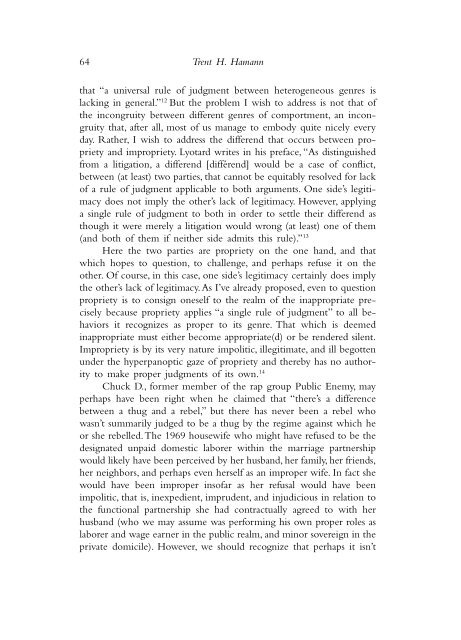You also want an ePaper? Increase the reach of your titles
YUMPU automatically turns print PDFs into web optimized ePapers that Google loves.
64 Trent H. Hamann<br />
that “a universal rule <strong>of</strong> judgment between heterogeneous genres is<br />
lacking in general.” 12 But <strong>the</strong> problem I wish to address is not that <strong>of</strong><br />
<strong>the</strong> incongruity between different genres <strong>of</strong> comportment, an incongruity<br />
that, after all, most <strong>of</strong> us manage to embody quite nicely every<br />
day. Ra<strong>the</strong>r, I wish to address <strong>the</strong> differend that occurs between propriety<br />
and impropriety. Lyotard writes in his preface, “As distinguished<br />
from a litigation, a differend [différend] would be a case <strong>of</strong> conflict,<br />
between (at least) two parties, that cannot be equitably resolved for lack<br />
<strong>of</strong> a rule <strong>of</strong> judgment applicable to both arguments. One side’s legitimacy<br />
does not imply <strong>the</strong> o<strong>the</strong>r’s lack <strong>of</strong> legitimacy. However, applying<br />
a single rule <strong>of</strong> judgment to both in order to settle <strong>the</strong>ir differend as<br />
though it were merely a litigation would wrong (at least) one <strong>of</strong> <strong>the</strong>m<br />
(and both <strong>of</strong> <strong>the</strong>m if nei<strong>the</strong>r side admits this rule).” 13<br />
Here <strong>the</strong> two parties are propriety on <strong>the</strong> one hand, and that<br />
which hopes to question, to challenge, and perhaps refuse it on <strong>the</strong><br />
o<strong>the</strong>r. Of course, in this case, one side’s legitimacy certainly does imply<br />
<strong>the</strong> o<strong>the</strong>r’s lack <strong>of</strong> legitimacy. As I’ve already proposed, even to question<br />
propriety is to consign oneself to <strong>the</strong> realm <strong>of</strong> <strong>the</strong> inappropriate precisely<br />
because propriety applies “a single rule <strong>of</strong> judgment” to all behaviors<br />
it recognizes as proper to its genre. That which is deemed<br />
inappropriate must ei<strong>the</strong>r become appropriate(d) or be rendered silent.<br />
Impropriety is by its very nature impolitic, illegitimate, and ill begotten<br />
under <strong>the</strong> hyperpanoptic gaze <strong>of</strong> propriety and <strong>the</strong>reby has no authority<br />
to make proper judgments <strong>of</strong> its own. 14<br />
Chuck D., former member <strong>of</strong> <strong>the</strong> rap group Public Enemy, may<br />
perhaps have been right when he claimed that “<strong>the</strong>re’s a difference<br />
between a thug and a rebel,” but <strong>the</strong>re has never been a rebel who<br />
wasn’t summarily judged to be a thug by <strong>the</strong> regime against which he<br />
or she rebelled. The 1969 housewife who might have refused to be <strong>the</strong><br />
designated unpaid domestic laborer within <strong>the</strong> marriage partnership<br />
would likely have been perceived by her husband, her family, her friends,<br />
her neighbors, and perhaps even herself as an improper wife. In fact she<br />
would have been improper ins<strong>of</strong>ar as her refusal would have been<br />
impolitic, that is, inexpedient, imprudent, and injudicious in relation to<br />
<strong>the</strong> functional partnership she had contractually agreed to with her<br />
husband (who we may assume was performing his own proper roles as<br />
laborer and wage earner in <strong>the</strong> public realm, and minor sovereign in <strong>the</strong><br />
private domicile). However, we should recognize that perhaps it isn’t
















